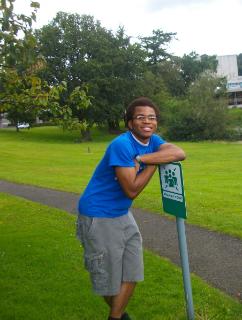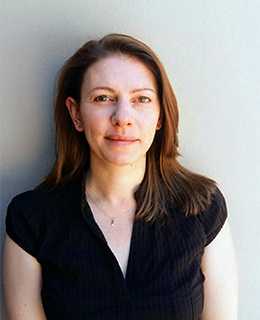PhD and MRes
Stephanie Baker, PhD candidate

Topic: Research into Medieval Scottish Food, specifics of time and food type being determined
Supervisors: Professor Richard Oram and Dr Alasdair Ross
Tell me what you eat, and I will tell you who you are (Jean Anthelme Brillat-Savarin)
Food, while not the most important cultural marker, is a unique part of culture that reflects both biological need and cultural wants. It is the fuel that moves individuals through their lives and defines groups and relationships. While not a complete mystery, compared to elsewhere in medieval Europe not much effort has been put into researching the food of medieval Scotland. My research goals are to remedy this oversight and discover the details and sources of the medieval Scottish diet. This search will include prepared meals and items as well as the resources used to make these meals. I am especially interested in fermented, baked, and aged items and will be focusing on these as is possible.
My long-term research passions have always rested in food and food culture. I completed my undergraduate dissertation on the increased popularity of sushi outside Japan and my Master’s on Medieval Scottish livestock.
Benneth Esiana, PhD candidate

Topic: Investigating the Carbon Store of Anthropogenically Deepened Urban Soils in Scotland
Supervisors: Dr Paul W. Adderley and Professor Richard D. Oram
In Scotland and around the world, past geoarchaeological investigations have identified anthropogenically-deepened soils in urban, peri-urban and rural settings and interpreted them in respect to past site activity. Centuries of application and accumulation of bio-waste materials (human and animal waste, slaughter house and fish-gutting wastes) and other additives such as turf, peat, fire residues, etc., have created a significant store of organic rich materials (Carbon). The implications of management change and the fate of these soils in the environment has received relatively little detailed investigation.
My research seeks to investigate the fate of these bio- wastes and organic by-products in and around a set of medieval urban settlements. It also simultaneously attempts to develop an understanding of the historic patterns of settlements through the stratigraphic study of taphonomic processes of urban regoliths. Given the long-term historical record of the application of bio-waste to locales from the late medieval period to the nineteenth century in Scotland, an understanding of the long-term fate of these materials can be developed by combining multiple evidence types i.e. documented records of the application of bio-waste materials combined with a range of soil-based methodological tools such as X-ray Fluorescence (XRF), magnetic susceptibility technique, differential pyrolysis, Carlo-Erba 1108 elemental Analyzer (C:N) amongst others. Characterising turnover rate of these carbon-rich soil materials under different environmental conditions would contribute both to the understanding of ‘deep urban soils’ and enhance our ability to construct a more accurate picture of carbon reserve/store in Scotland
My future research plans are to build upon the foundations of my PhD, collaborating with environmental agencies, governmental and non-governmental organisations, and industries to provide valuable information in the development or revision of national-level climate change mitigation policy and management practises across a range of historical landscapes, and in doing so contributing to the global knowledge base.
Education: B.Sc. (Hons) Biology and Environmental Science (University of Stirling)
Rhona Ramsay, Ph.D. candidate

Topic: Unsettling Naken chaetrie in Scottish museums: presence, agency, value, and interpretation
Supervisors: Dr Sally Foster (University of Stirling) and Dr Nyree Finlay (University of Glasgow)
The research I am carrying out is into Naken chaetrie (the material culture of Gypsy/Travellers) in Scottish museums. I am particularly interested in how this material is valued, interpreted and situated.
My background as a museum professional has mainly been focused on learning and community engagement. It was during my time at the Highland Folk Museum (2004-2008) that I first worked with collections with an acknowledged Naken connection, and during this time I developed and delivered a series of partnership projects which brought young Nakens into contact with museum collections related to their cultural heritage. My current research has grown out of an interest developed through these projects and an awareness of a gap in museum policy and practice within Scotland in relation to Naken chaetrie.
Using the Highland Folk Museum as a starting point I am currently exploring what might constitute Naken chaetrie. As well as culturally specific items, such as a pair of skivvies, pearl fishing equipment, and a fire tripod, there are many Naken-made items, including silver brooches, clothes pegs, baskets, tinware and hornware within museum collections. Beyond this there is also a body of material with other Naken connections, e.g. mended pottery, pottery brought north from Portobello or Staffordshire, and items brought into the collection by Naken fieldworkers, or bought from Nakens trading in secondhand material. Where possible the names of Nakens linked to items in the museum collections will be uncovered and acknowledged. One of the aims of the research is to unsettle Naken chaetrie found in Scottish museums, by bringing it together with expert knowledge from within the community to offer new interpretations, as well as to examine the value of this material within the source community. The value of this material to museum staff and visitors will also be examined.
This research is funded by the Arts and Humanities Research Council’s Doctoral Training Partnership, administered by the Scottish Graduate School for Arts and Humanities.
Elizabeth Robson

Topic: Wrestling With Social Value - An Examination of Methods and Approaches for Heritage Management and Conservation
Supervisors: Professor Siân Jones and Dr Peter Matthews (University of Stirling), Judith Anderson and Karen Robertson (Historic Environment Scotland).
Currently, there is a gap between heritage conservation instruments, which place increasing emphasis on ‘social value’, and routine heritage management, where social value remains poorly addressed and understood. My research contributes to bridging this gap through developing a better understanding of how to capture social value in real-world heritage contexts.
I will be developing a suite of rapid qualitative methods for examining social values, to be trialled at a number of field sites in Scotland. The sites will include a variety of historic environments, as well as a range of management and conservation contexts, in order to evaluate how the methods perform in different scenarios. Towards the end of my research, the methods and findings will be translated into a ‘toolkit’ for practical application by heritage conservation professionals. Adoption of the methodologies will provide heritage organisations with a firmer evidence base to inform policy, guidance and decision‐making at local and national levels. More broadly, the research will support a more sophisticated understanding of how methods can be combined to evidence the social value of heritage; allowing the heritage sector, in Scotland and beyond, to better demonstrate its impact upon society.
My research combines a lifelong interest in history and heritage with issues explored through my M. Res. of how social values, such as identity, are reflected in environmental management processes. It also draws from my 15-years of experience working with international organisations promoting human rights and citizen participation.
This project is co-funded by and conducted in collaboration with, Historic Environment Scotland.
Education: B.A. (hons) History (University of Exeter), M. A. Environment, Development and Policy (University of Sussex), M. Res. Social Anthropology (University of Aberdeen)
Zoe Russell

Topic: Moving Beyond ‘Common-Sense’ in Nature-Culture in the Scottish Highlands: Socio-environmental
Supervisors: Professor Siân Jones (Heritage) and Professor Samantha Punch (Sociology), University of Stirling
This research will explore the social construction of heritage and human environment relations in the Scottish
Education: B.A. (Hons) Politics and Criminology (University of Stirling), MSc. Global Environment, Politics and
Irina Timonina

Hydraulic fracturing, or “fracking”, remains a highly contested issue in politics. Energy companies and politicians supporting
The Scottish subsystem, placed within a wider “nesting doll” of a UK shale policy subsystem, was selected as a research case
My study tries to explain the puzzle of high UK government commitment versus Scottish government reluctance to accept
